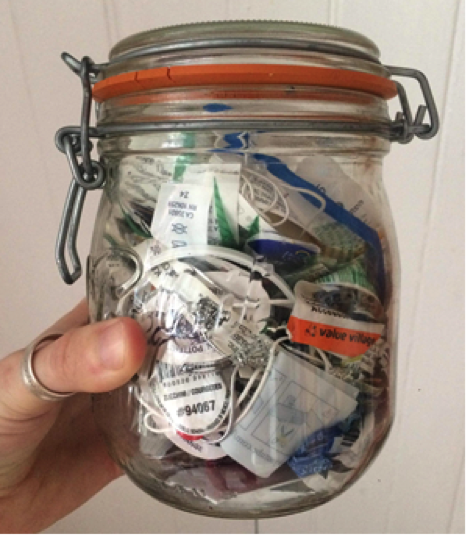Kate Pepler can fit the garbage she accumulates in one year in one small jar.
Items such as food stickers, clothing tags, straws and pill bottle wrappers are the few bits of waste that end up in the jar.
Pepler grew up on Toronto Island: a green oasis in Lake Ontario, within spitting distance of the CN Tower. There were no cars says Pepler. The only way to reach Toronto was by ferry. The island bloomed with nature and the outdoors was her playground. It’s where her love and appreciation for nature began.
After graduating high school, Pepler moved to the east coast and attended Dalhousie University where she learned about environmental issues hurting the world.
Pepler wanted to make a change, so she began reducing her waste. Now, after living a zero-waste lifestyle for just over a year, Pepler hopes to make the transition easier for people in Halifax to learn about and become zero-wasters themselves.
This fall, Pepler will be opening a zero-waste store called Tare in the North End of Halifax to provide Haligonians access to zero-waste shopping.
Tare will provide customers a place to buy items in bulk that typically can’t be purchased without plastic packaging. Such as grains, cereals, nuts, beans, shampoos, conditioners, oils, vinegars and cleaning products.
Reusable containers to purchase food will be required; you can either bring containers from home or purchase them at the store. Tare will also sell zero-waste items like bamboo toothbrushes and reusable feminine hygiene products with recyclable packaging.
Zero-waste means to sustainably create and discard materials to eliminate the volume of harmful waste materials. Implementing zero-waste would eventually eliminate all discharges to land, water or air that are a threat to planetary, human, animal or plant health.
Nova Scotians on average generate 404 kilograms of waste each year, which is the lowest in all of Canada according to Jeff MacCallum CEO of Divert Nova Scotia, a not-for-profit working to divert waste and foster a culture of recycling in Nova Scotia.
“I think there are a lot of people interested in it, but it’s not accessible yet,” says Pepler.
Since graduating in 2016, Pepler has founded ourpositiveplanet.com, a website sharing environmental success stories. Pepler wanted to find ways to make a tangible impact and came up with the idea of Tare.
“I’ve toyed with the idea for a while now but the store really combines all of my passions. Zero-waste, community and environmental education.”
In addition to selling zero waste products, Tare will function as a coffee shop and community space. It’s going to be the first zero-waste coffee shop in Halifax.
Pepler’s experience as a sailing and snowboarding instructor will help her host educational and DIY workshops for kids and families. Eventually, she hopes to expand to offer environmental consulting for businesses, which will help businesses transition into using sustainable production.
Zero-waste living may bring back some old-fashioned ways, but it may also be the way of the future. Canadians generate on average 720 kilograms of garbage per-person per-capita, and a zero-waste living is beneficial in saving consumers money and improving health says Barb Hetherington of Zero Waste Canada.
“Just to show a comparison, we produce about twice as much waste per person than Japan. We are a country of wasters,” she says. “We at Zero Waste Canada find it very inspiring to see entrepreneurs across our country developing solutions to our waste problem. Zero waste is an action that everyone can take to combat climate change.”
MacCallum says, “The key is an ongoing effort, so it’s something that you have to continue to do; that way you don’t lose a generation.”
Pepler says it’s taken her a while to get where she is today.
For her, the first step to reducing her waste was opting for a reusable water bottle instead of purchasing disposable ones. Her next step was to stop buying coffee unless she had a reusable cup. Pepler says this was her biggest challenge. Most coffee cups aren’t recyclable despite their eco-friendly appearance. The inner parts of some coffee cups are lined with a plastic material deeming them unrecyclable.
Pepler was then able to make small daily changes such as using reusable bags to grocery shop, picking up garbage, refusing plastic straws with drinks and buying products without packaging.
“It wasn’t a snap of the fingers and I lived zero-waste. It was definitely something that I have been working towards intentionally or unintentionally for quite a while now.”
Pepler carries a zero-waste kit to ensure she’s always prepared: reusable cutlery, a water bottle/thermos/mason jar, a container and reusable cotton bags. Pepler believes making small actions like these create a snowball effect that will have impact.
She hopes her store helps people recognize the amount of waste they create.
“I think zero waste living is important because we are in a time of crisis. We are polluting oceans and ecosystems, and harming other species because of our addiction to plastic. We need to shift as a society away from plastic, and to more reusable and sustainable options.”


Recent Comments